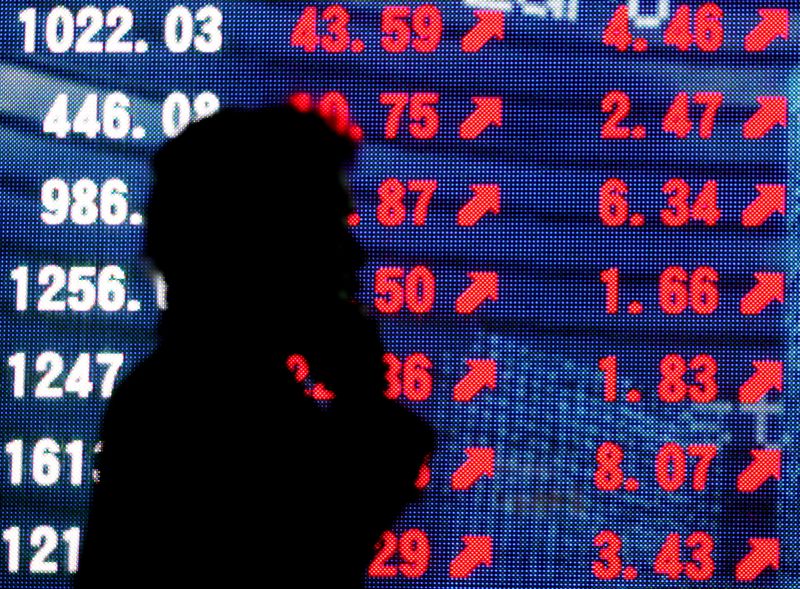By Hideyuki Sano and Alwyn Scott
TOKYO/NEW YORK (Reuters) - Asian shares inched up on Wednesday following buoyant manufacturing indicators from the United States and elsewhere and a rally in U.S. tech shares, with investors also expecting more policy support from Washington.
European stocks are expected to follow Asia's upbeat lead, with pan-European Euro Stoxx 50 futures up 0.64% and German DAX futures up 0.75%. FTSE futures traded 0.86% higher.
MSCI's broadest index of Asia-Pacific shares outside Japan gained 0.3% while Japan's Nikkei advanced 0.5%. In China, the bellwether CSI300 index rose 0.2%.
On Wall Street, both the S&P 500 and Nasdaq boasted record closing highs, with the technology sector leading the charge.
Apple (NASDAQ:AAPL), the world's biggest company by market capitalisation, rose just under 4% to take its value to almost $2.3 trillion after a media report that the company had asked suppliers to make at least 75 million 5G iPhones for later this year.
U.S. manufacturing indicators showed expansion, with the reading from the Institute for Supply Management hitting its highest level in nearly two years.
"On top of the strong headline figure, looking at new orders and inventories components in the survey, the manufacturing sector looks unlikely to falter any time soon," said Shogo Maekawa, global market strategist at JPMorgan (NYSE:JPM) Asset Management.
Euro zone manufacturing activity also grew last month to stay on a path toward recovery, though factory managers remained wary about investing and hiring more workers.
"At the moment the market is seeing a lot of positive momentum," said Greg Boutle, U.S. head of equity and derivative strategy at BNP Paribas (OTC:BNPQY) in New York. "If you get OK-to-good data and anything from the political landscape that looks like its moving more toward a compromise that's constructive for markets."
U.S. Treasury Secretary Steven Mnuchin said on Tuesday he would telephone House Speaker Nancy Pelosi about stalled coronavirus aid negotiations later in the day.
White House chief of staff Mark Meadows said Senate Republicans are likely to bring up a targeted COVID-19 relief bill next week.
The U.S. Federal Reserve dabbed in more support for the economy as Governor Lael Brainard said the central bank would need to provide more stimulus to fulfil its promise of stronger job growth and higher inflation.
Brainard's comments helped to push down the 10-year U.S. Treasuries yield to 0.680% from above 0.7%. Last week it rose to as high as 0.789%, the highest in 2-1/2 months.
"We are entering the second stage of central bank-financed government stimulus," said Hiroshi Watanabe, senior economist at Sony (NYSE:SNE) Financial Holdings.
"This means U.S. nominal bond interest rates will be kept low and real interest rates will decline. The dollar will continue to fall while boosting various asset prices from gold to stocks."
The yield on inflation-protected U.S. Treasuries, or real U.S. yields, remained depressed at minus 1.092%, near a record low of minus 1.111% hit last month.
The strong manufacturing data also helped the U.S. dollar claw back losses a tad for now after it hit a 28-month low against a basket of currencies on Tuesday.
The dollar index stood at 92.381, off Tuesday's low of 91.737.
The euro changed hands at $1.1905, flat on the day after touching above $1.20 for the first time since 2018 during Tuesday's trading.
The dollar was firm on the yen at 106.04 yen.
The Australian dollar lost as much as 0.5% to $0.7338, after GDP data showed the Australian economy suffered a deeper-than-expected 7% contraction in the last quarter, its worst economic downturn on record and confirming its first recession in about three decades.

Brent crude futures rose 0.9% to $46.01 a barrel. U.S. West Texas Intermediate futures gained 1.0% to $43.18 a barrel.